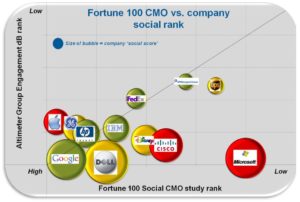Last month I wrote this post sharing my views on how to achieve success in social media and one of the four key ingredients I had identified was the need to secure executive support. I then saw this study that examined the social behaviors of the Fortune 100 CMOs. While the overall results did not appear too surprising, with only 15 out of the total 143 CMOs and Chief Communications Officers having active Twitter accounts, some of the companies on the list did surprise me.
 I then decided to cross-reference these results with those of a 2009 Altimeter Group study that evaluated the overall ‘social’ score of the world’s top 100 brands, and this confirmed my suspicions. Besides the fact that 8 of the 20 companies in the Fortune100 CMO study did not appear at all in the Altimeter Group study, the correlation of leadership in social business and whether your CMO is active on Twitter between the remaining 12 is quite low. The most glaring outlier was Microsoft which ranked fifth (out of 100) in the Altimeter Group study, although their CMO appears to be dead last in the Fortune100 study.
I then decided to cross-reference these results with those of a 2009 Altimeter Group study that evaluated the overall ‘social’ score of the world’s top 100 brands, and this confirmed my suspicions. Besides the fact that 8 of the 20 companies in the Fortune100 CMO study did not appear at all in the Altimeter Group study, the correlation of leadership in social business and whether your CMO is active on Twitter between the remaining 12 is quite low. The most glaring outlier was Microsoft which ranked fifth (out of 100) in the Altimeter Group study, although their CMO appears to be dead last in the Fortune100 study.
While one can argue the validity of these studies (e.g., while Google ranked fourth in the Altimeter Group study, Eric Schmidt, Google’s ex-CEO, publicly admitted that he ‘screwed up’ with social just this past week), the fact still remains that success in social media does not equate to having a Twitter account.
So, how can you then determine if your CxO gets (or will ever get) social media before you embark on this journey? I believe answering these 3 questions is all you need to know:
- Do they lead through listening? There are numerous studies that have shown that the strongest leaders are also good listeners. Read this Harvard Business Review blog post, or view this video from Tom Peters for more details. One of the key tenets of social is the ability and willingness to listen before engaging, and unless your leaders exhibit this behavior, they will never get it.
- Are they willing to let go or are they micro-managing you? In your interactions with them, do you find they are willing to let you take risks or do they breathe down your neck every step of the way? With social comes the realization of apparent loss of control – I say apparent, since regardless of what we think, our customers are already talking about us. The question is do we want to join (and hopefully influence) the conversation, or not? If you want to understand this further, I suggest reading Charlene Li’s latest book on Open Leadership.
- Are they patient? As any practitioner will tell you, developing an ongoing dialogue with an engaged audience takes time and perseverance. Unless your CxO understands this, she will be asking you why you haven’t delivered more leads or deflected more customer service calls after 4 weeks.
Did you notice that none of these questions have anything to do with social? Of course, if your CxO is a practitioner, this is an added bonus; just keep in mind, however, that being a practitioner does not imply just having a Twitter account. Just think of Michael Dell of Dell (Twitter), John Chambers of Cisco (video blog), or Tony Hsieh of Zappos (blog, Twitter). While they are all active in social media, they are first and foremost strong leaders.
As always, I look forward to your thoughts and comments.
Ted:
I don’t know if those research studies took this into account but my research has shown that many CxO types seem to participate in exclusive (aka gated) communities that keep out the riff raff.
Hence, the crawlers and researchers of Google and Altimeter might not have been able to look over that fence…
This makes the most sense to me, and I think all C-level folks (and really anybody in the organization) should follow the guidance of our CEO Bill McDermott: If you are not doing anythign that contributes to selling (in the long run), don’t do it. And the C-level types should make the time to jump into social media to help sell into those exlusive communities. Not by making annoying pitches but by providing guidance to their peers on what they know best…providing a valued service that in turn helps with revenue generation (and creates happy customers).
Cheers,
Natascha